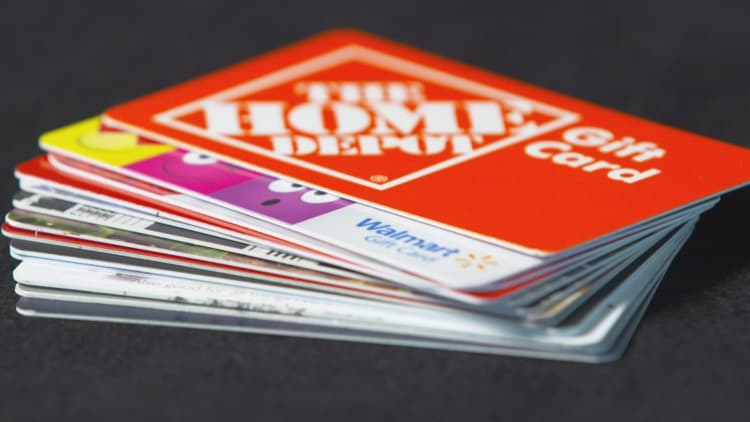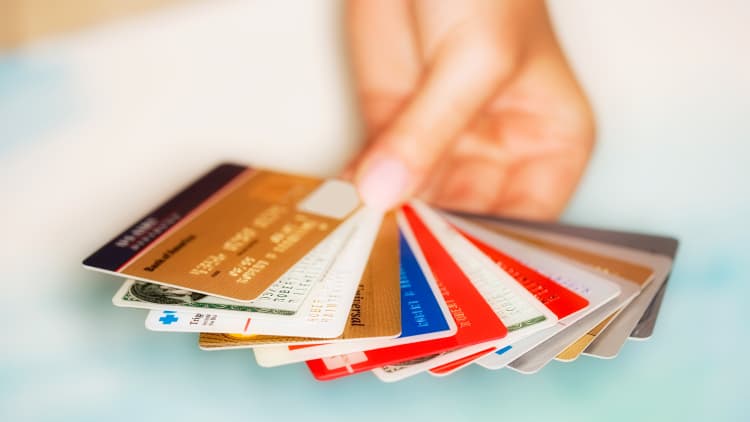
A shadowy world of criminals has been targeting major retailers around the country to take advantage of lenient store-return policies and fuel their drug addictions, a CNBC investigation has found.
And they use an unlikely currency to pull off the crime: gift cards.
For years, thieves have taken aim at big-name stores, including Home Depot, Lowe's, Target and Walmart, by stealing items and returning them at another store without a receipt. They typically receive a gift card for the stolen goods and then sell it to a pawn shop or secondary store at a discount.
While retailers say they are doing everything they can to reduce return fraud overall, both law enforcement and the drug users themselves say the scam is relatively easy to pull off.
"When you're suffering from addiction, any length means any length," said Kristen Booth, 23, who has been arrested twice for retail return fraud in connection with gift cards.
Booth was among four patients who candidly spoke to CNBC at Gateway Community Services, a drug rehab center in Jacksonville, Florida.
A recovering heroin and oxycodone user, Booth said getting the gift cards for the stolen items was routine.
"I've definitely stolen, I have, you know, took advantage of people," she said. "I would get receipts and take them back in there, and I would go and take things off the shelf. I would make sure I left the store so on camera it looked like I purchased the items, and then come back go to customer service."
While there are no national figures linking gift-card crimes to drugs, retail-return fraud itself continues to be a major problem.
A 2017 survey by the National Retail Federation found 57 percent of companies reported "fraudulent gift cards or store credit in at least one location," which is lower than previous years, when it stood at about 66 percent. The association estimates that retail return fraud losses cost $9 billion to $15 billion a year.
Amber Ross, 27, another patient at Gateway, had a similar experience.
"I would go to Home Depot, Lowes, Walmart to take stuff, leave, go to another Home Depot, take it back to get a gift card," she said.
She said if she didn't want to use her own ID, she often found other people to use their's to cash in the gift card. She would then share the cash proceeds with them.
"And then they'd give me the cash, and I'd call my drug dealer," she said.
Law enforcement officials say cashing in gift cards to pay for opioids is becoming more prevalent throughout the U.S.
"The outright theft is not as common as it used to be, now that there is loading of gift cards and the online sales of these gift cards. And law enforcement is just really not familiar with tracking it yet," said Sheriff's Lt. David Ballard in the Shelby County, Tennessee.
Typically, after thieves gets the gift card, they take it to a pawn shop, a secondhand store or a business that buys cards at a large discount, Ballard said. The cards are then resold usually to an online exchange.
Booth says addiction makes users ignore the consequences of getting caught. "And you don't care how many charges you have, you don't care what you've been through; you just care about the next one," she said.
The recovering drug abusers at Gateway told CNBC they clearly remember the feeling of desperation for quick cash. "I feel like I could've found a way around any rule they make," said Ashlee Smith, 24. She used drugs for the past decade. "As an addict, I just feel like I go to any length."
Joshua Lopez, a behavioral health tech at Riverside Recovery of Tampa, helps others in recovery. He said the gift card scheme is well known.
"You hear it from the grapevine. Like you have one friend that's like, 'Oh yeah, so I went and I stole this and returned it,'" he said.
"You choose a big chain and then you steal something that's small and that has like a high dollar amount per item," he said. "And then go to the same chain in a different location and that's they way that they normally do it, if you don't have a receipt, you show your ID. Certain places, if you return something, like the reason they show their ID is because they look it up to see if you've returned anything else in any other store. And if you've had, like more than three, they flag you."
At least one state — Tennessee — has found a direct connection between gift cards and drug overdoses. In Knox County, police linked 16 of 19 overdoses to the sale of gift cards during a one month period this year. In the city of Knoxville, police tracked 83 to 98 overdoses to gift cards during a three-month period.
Those numbers stunned Tennessee state Sen. Richard Briggs, who is also a cardiovascular surgeon.
"Absolute shock," Briggs said. "It would be no different than if there was a rock lying there. And if you lifted it up, and this horrible smell came out, and this monster came out. We had no idea that the organized retail theft was related so intimately with the opiate and drug trade in general in Appalachia."
Briggs sponsored legislation this year that requires all transactions involving cash for gift cards on the secondary market to be reported to local law enforcement. But the law does not impose a penalty for not complying, and Briggs said he plans to push for tougher rules next year.
Tennessee loses more than $14 million a year in sales tax revenue due to this crime, according to a retail industry report.
"The criminal element is very creative," Briggs said. "And I don't think this is the sole problem to solving financing of the opiate problem in Tennessee. But it's one part of the problem. And right now it's a very big part of the problem."
Home Depot said it has changed its policy to crack down on return fraud and acknowledged the link between gift cards and drugs.
"Of course, it impacts our bottom line, but it's also about safety of the community, drug trafficking, even terrorism," Home Depot spokesman Matt Harrigan told CNBC.
Home Depot only accepts "store credits for in-store purchases and we require proof of ID when store credits are redeemed at checkout because of the increase in return fraud," Harrigan said. "We never want to inconvenience our customers, but this policy impacts more than just our bottom line. It helps minimize returns fraud tied to bigger organized crime in the community."
The home-improvement retailer's store credits differ from gift cards because they cannot be used online, which limits their resale value. Its gift cards are more open to resale.
The company also does not allow customers "to buy gift cards with store credits or another gift card due to the potential fraud linked to that behavior," Harrigan said in a statement.
Target's return policy also attempts to limit gift-card fraud. If the store can't find a receipt when employees try to look one up, they may offer exchanges or store credits.
The company also says it limits the number of returns without a receipt.
Walmart has "in place a series of policies and procedures to closely monitor merchandise returns where no receipt is required," said Charles Crowson, senior manager of corporate communications.
Lowe's, which also works with law enforcement and the retail industry to combat return fraud, will "hold perpetrators accountable for their illegal conduct," said Steve Salazar, corporate communications manager.
On the police side, the Coalition of Law Enforcement and Retail sees the return fraud-opioid connection as a top priority.
The group will be "leveraging its public and private partnerships to combat the crisis in both areas," said Curt Crum, president of the coalition.
The larger business community is also taking aim at the issue.
Retail Theft Analysis, a Florida-based private company, is pitching software to police departments to help track the number and value of gift cards that stores buy and individuals sell.
CEO Matt Ryan said the company found one example of a customer who sold $349,000 worth of gift cards to a store in Tennessee during a three-month period. Most of them were iTunes cards.
"This data tells me this is somebody that they should look at pretty closely," Ryan said. "The other thing I would look at is what store he is selling to. Because this type of store is obviously not really examining who they're buying cards from. Because anybody that's bringing in [$349,000] worth of iTunes cards is probably doing something fraudulent."
To the drug abusers in treatment, all of these efforts are positive signs as they all try to rebuild their lives.
"I've always told myself I'd be a wonderful mom," Booth said, wiping away tears. "I'd do anything for my little girl. And it's crazy to look back and see all the times that I didn't care, how selfish I can be."
WATCH: Big retailers being targeted for gift card opioid scheme





